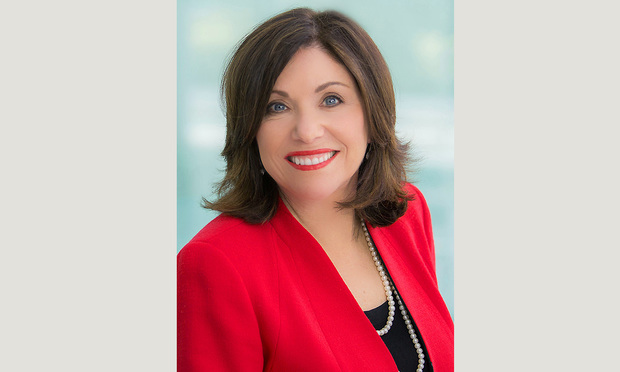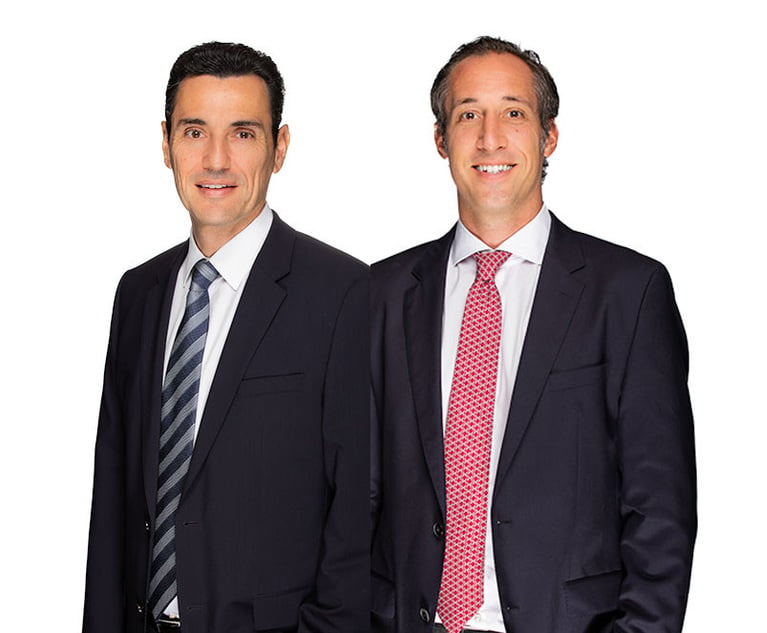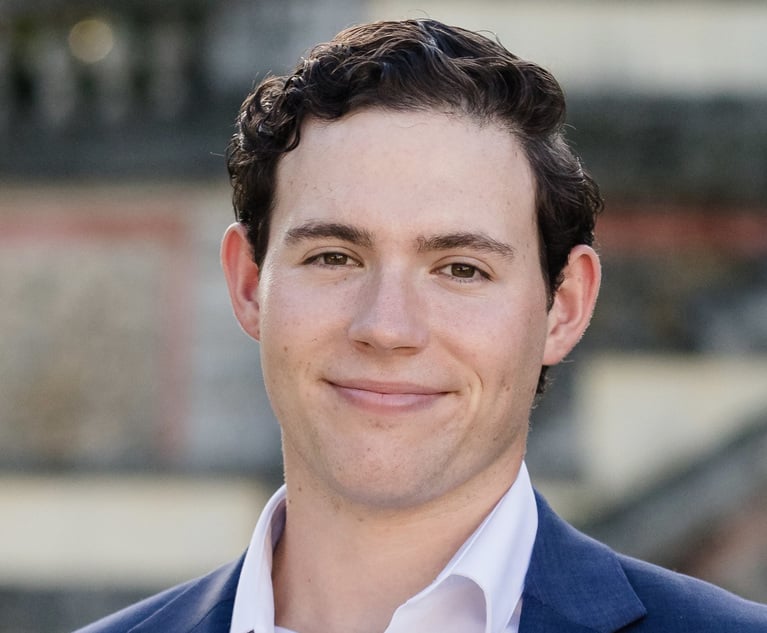Brinkley Morgan Takes a Mid-Market Approach With Family Law Drilldown
The 22-attorney law firm has three offices in Broward and Palm Beach counties.
July 08, 2020 at 11:43 AM
9 minute read
 Roberta Stanley, Managing Partner, Brinkley Morgan, Fort Lauderdale. Courtesy photo
Roberta Stanley, Managing Partner, Brinkley Morgan, Fort Lauderdale. Courtesy photo
Brinkley Morgan is a 45-year-old mid-market law firm with three offices in Broward and Palm Beach counties.
Certified marital and family law specialist Roberta Stanley has served as managing partner of the 22-attorney firm for three years.
She was hired as a partner in 1996 to establish the firm's family law practice, now its flagship practice area, and is a former president of the Florida chapter of the American Academy of Matrimonial Lawyers.
Interviewed after taking over firm management, she attributed her rise to the leadership post to hard work, mentoring others, respect for others and a supportive spouse.
Stanley succeeded real estate attorney Philip Morgan, who was in charge for nearly 20 years and remains a partner.
In a question-and-answer format, she offers an overview of the firm, its focus and its operations.
Firm: Brinkley Morgan
Firm Leader: Roberta Stanley, Managing Partner
Attorneys: 22
Locations: Fort Lauderdale, Boca Raton and West Palm Beach
Practice Areas: Brinkley Morgan provides a full range of legal services to help counsel the South Florida community. Among its practice areas are real estate; business litigation; corporate; wills, trusts and estate planning; probate litigation; local government; marital and family; bankruptcy; administrative and tax. Brinkley Morgan is one of the few law firms in the country with a female lawyer as its managing partner and with several female lawyers in leadership positions. What also makes the firm unique is that it has developed a niche in marital and family law, representing clients on issues such as dissolution of marriages with particular expertise in high net worth and complex matters, pre- and post-nuptial agreements, paternity claims and adoption. The family law practice takes an individualized approach achieving each client's objectives, often bringing in attorneys from the firm's other practices so clients know that they have a team of attorneys who can help them with their family law matter, from counseling them on the division of real estate assets to estate planning needs. We are able to navigate each and every aspect of law which may tangentially arise from any particular family law matter.
Our other practice areas include administrative law and practice, bankruptcy and creditors rights, business litigation and appellate practice, corporate law and business development, employment law, income, estate and gift tax, local government law and relations, estate and trust litigation, real estate and wills, trusts and estate planning and administration.
Governance structure and compensation model: The firm is headed by the managing partner who leads a management committee of equity and non-equity partners to assist in running the firm. Lawyers have the ability to earn promotions, including partnership, through their outstanding legal work and by providing exceptional service to clients.
Do you offer alternative fee arrangements? It's on a case-by-case basis depending on the specialty involved and the merits of the matter. Any potential case presenting qualifying criteria is brought before and must be approved by the management committee.
What do you view as the two biggest opportunities for your firm, and what are the two biggest threats? I think the coronavirus, which has obviously presented a global pandemic, has forced us and many other businesses to reevaluate our biggest opportunities and threats moving forward. Thanks to our transition to paperless about seven years ago, working from home for the staff and lawyers has been seamless and allowed us to provide a continuous level of service to our existing and new clients. I also think that working remotely is going to be more accepted in the practice of law, particularly in light of the development and widespread application of virtual hearings for more routine proceedings. The ability to successfully maintain the practice is one of the few highlights in an otherwise daunting global environment.
Another opportunity for our firm is that our young associates are developing into impressive attorneys. The senior associates are encouraged to originate their own work and are handling more cases as the lead attorney. Regarding practice areas, we see opportunities in business and real estate litigation involving contract disputes and landlord-tenant disputes as a result of COVID-19. Like many other firms, we also anticipate an increase in divorces in part because some divorces were put on hold during the pandemic and because couples may have realized during the quarantine that they no longer want to be together.
We do expect to see a threat to children as more families are forced to stay at home due to COVID-19. Children will need to be protected from negative environments involving drugs, alcohol and domestic violence. We anticipate our family law attorneys who work on child protection issues to see an increase in cases.
The biggest threat for all businesses is the economic uncertainty caused by the coronavirus and the time it will take to manage or provide a vaccine for the illness. It is very important to keep connected to the staff and other lawyers in this time of remote working so the culture we work hard to provide will withstand this distancing.
The legal market is so competitive now — what trends do you see, and has anything, including alternative service providers, altered your approach? Is your chief competition other mid-market firms, or is your firm competing against big firms for the same work? We are uniquely positioned in the legal market since we are a mid-market firm with a niche in marital and family law. We can cover all of your family law needs. We utilize attorneys with all different expertise to meet the specialized needs of each case. Along with varying family law lawyers with different expertise, we are able to offer our clients the assistance of attorneys with expertise in estate and trust litigation, real estate law, corporate and business law, wills, trusts and estate planning. What also makes us different in the mid-market legal world is that we strive to provide high-quality service to clients in all different economic circumstances.
We are celebrating our 45th anniversary, and our success is based on the reputation we have built taking a proactive and innovative approach to each client's unique personal and business needs by maintaining an uncompromising adherence to high ethical standards and legal traditions. There are very few firms that are able to achieve an anniversary of so many years, and we attribute that achievement to the particular lawyers and team that have been cultivated over that period of time.
We are also committed to being a proud member of South Florida's community, and many of our lawyers support and are active in charitable organizations both in Broward and Palm Beach counties. The firm also is actively involved in numerous charitable initiatives in the region through Brinkley Morgan Cares, the firm's charitable campaign dedicated to supporting local nonprofits and helping individuals in need. Each year, we host two to four charity drives to assist various organizations, including the firm's annual Halloween Costume Drive in October for the Children's Diagnostic & Treatment Center in Fort Lauderdale. The firm's attorneys and other employees personally deliver the costumes each year to the pediatric patients at the center. Other examples of the firm's various charity drives include hosting food, hygiene and clothing drives to benefit organizations helping homeless children and adults in Broward and Palm Beach counties, including The Lord's Place and the Broward Partnership for the Homeless Inc.; hosting holiday gift drives for SOS Children's Villages Florida and the Boys & Girls Clubs of Broward County's Adopt-a-Family; collecting school supplies for ChildNet of Broward and Palm Beach counties and Kids In Distress of Broward and Palm Beach counties; and holding a book drive benefiting the Palm Beach Literacy Coalition.
There is much debate around how law firms can foster the next generation of legal talent. What advantages and disadvantages do midsize firms have in attracting and retaining young lawyers, particularly millennials? Unlike many midsize firms, we offer flexible hours and remote working. We expect our attorneys to be able to provide excellent legal services to the clients whether working from home or in the office. We are able to attract talented attorneys and paralegals because of our flexible working hours. We really enjoy being together, but we transitioned from the notion that you're mandated to maintain a uniform schedule many years ago thanks in large part to technology. As long as our clients are served and a quality product is produced, our attorneys can work from anywhere or in the middle of the night if they choose. It's proven to be a very beneficial model for us to attract and keep talent.
Does your firm employ any nonlawyer professionals in high-level positions (e.g. COO, business development officer, chief strategy officer, etc.)? If so, why is it advantageous to have a nonlawyer in that role? If not, have you considered hiring any? We have a firm administrator who is the nexus between management and our staff. It is very important to have one person working everyday on the administration of the office while the lawyers tend to legal matters.
What would you say is the most innovative thing your firm has done recently, whether it be technology advancements, internal operations, how you work with clients, etc.? We invested in technology and transitioned to paperless about seven years ago. That transition meant we didn't encounter any disruption to our service when stay-at-home orders were issued, such as those that were and in some circumstances are still in place. We also purchased phones that work over internet protocols so the staff and lawyers could have use of our office phones at home. We were able to communicate in a much easier way than by using cellphones. More recently, we created e-binders which organize documents with hyperlinks that allow courts, lawyers and clients alike to access pertinent documents in their cases.
Does your firm have a succession plan in place? If so, what challenges do you face in trying to execute that plan? If you don't currently have a plan, is it an issue your firm is thinking about? We have a partnership agreement with all partners, and we regularly discuss succession plans at our annual retreat. We have every intention of celebrating more landmark anniversaries for many years to come.
This content has been archived. It is available through our partners, LexisNexis® and Bloomberg Law.
To view this content, please continue to their sites.
Not a Lexis Subscriber?
Subscribe Now
Not a Bloomberg Law Subscriber?
Subscribe Now
NOT FOR REPRINT
© 2025 ALM Global, LLC, All Rights Reserved. Request academic re-use from www.copyright.com. All other uses, submit a request to [email protected]. For more information visit Asset & Logo Licensing.
You Might Like
View All
Saul Ewing Loses Two Partners to Fox Rothschild, Marking Four Fla. Partner Exits in Last 13 Months
3 minute read
Calif. Fires Should Serve as a Reminder to Fla.’s Commercial Landlords and Tenants Not to Be Complacent
6 minute read
The Hidden Risks and Benefits of Investing in a Condo-Hotel or Branded Condominium Unit
9 minute readLaw Firms Mentioned
Trending Stories
Who Got The Work
J. Brugh Lower of Gibbons has entered an appearance for industrial equipment supplier Devco Corporation in a pending trademark infringement lawsuit. The suit, accusing the defendant of selling knock-off Graco products, was filed Dec. 18 in New Jersey District Court by Rivkin Radler on behalf of Graco Inc. and Graco Minnesota. The case, assigned to U.S. District Judge Zahid N. Quraishi, is 3:24-cv-11294, Graco Inc. et al v. Devco Corporation.
Who Got The Work
Rebecca Maller-Stein and Kent A. Yalowitz of Arnold & Porter Kaye Scholer have entered their appearances for Hanaco Venture Capital and its executives, Lior Prosor and David Frankel, in a pending securities lawsuit. The action, filed on Dec. 24 in New York Southern District Court by Zell, Aron & Co. on behalf of Goldeneye Advisors, accuses the defendants of negligently and fraudulently managing the plaintiff's $1 million investment. The case, assigned to U.S. District Judge Vernon S. Broderick, is 1:24-cv-09918, Goldeneye Advisors, LLC v. Hanaco Venture Capital, Ltd. et al.
Who Got The Work
Attorneys from A&O Shearman has stepped in as defense counsel for Toronto-Dominion Bank and other defendants in a pending securities class action. The suit, filed Dec. 11 in New York Southern District Court by Bleichmar Fonti & Auld, accuses the defendants of concealing the bank's 'pervasive' deficiencies in regards to its compliance with the Bank Secrecy Act and the quality of its anti-money laundering controls. The case, assigned to U.S. District Judge Arun Subramanian, is 1:24-cv-09445, Gonzalez v. The Toronto-Dominion Bank et al.
Who Got The Work
Crown Castle International, a Pennsylvania company providing shared communications infrastructure, has turned to Luke D. Wolf of Gordon Rees Scully Mansukhani to fend off a pending breach-of-contract lawsuit. The court action, filed Nov. 25 in Michigan Eastern District Court by Hooper Hathaway PC on behalf of The Town Residences LLC, accuses Crown Castle of failing to transfer approximately $30,000 in utility payments from T-Mobile in breach of a roof-top lease and assignment agreement. The case, assigned to U.S. District Judge Susan K. Declercq, is 2:24-cv-13131, The Town Residences LLC v. T-Mobile US, Inc. et al.
Who Got The Work
Wilfred P. Coronato and Daniel M. Schwartz of McCarter & English have stepped in as defense counsel to Electrolux Home Products Inc. in a pending product liability lawsuit. The court action, filed Nov. 26 in New York Eastern District Court by Poulos Lopiccolo PC and Nagel Rice LLP on behalf of David Stern, alleges that the defendant's refrigerators’ drawers and shelving repeatedly break and fall apart within months after purchase. The case, assigned to U.S. District Judge Joan M. Azrack, is 2:24-cv-08204, Stern v. Electrolux Home Products, Inc.
Featured Firms
Law Offices of Gary Martin Hays & Associates, P.C.
(470) 294-1674
Law Offices of Mark E. Salomone
(857) 444-6468
Smith & Hassler
(713) 739-1250







